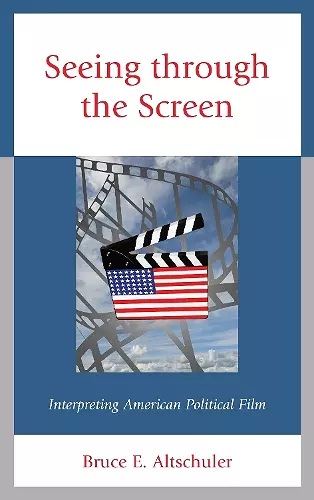Seeing through the Screen
Interpreting American Political Film
Format:Paperback
Publisher:Bloomsbury Publishing PLC
Published:28th Oct '19
Currently unavailable, and unfortunately no date known when it will be back
This paperback is available in another edition too:
- Hardback£85.00(9781498557481)

Although films affect and reflect the way Americans look at politics, they have received far less attention than television or newspapers. This is changing, particularly on college campuses, where courses on politics and film are growing in popularity. This book consists of short essays on approximately fifty American political films. It is distinctive in two ways. Firstly, it defines politics broadly enough to include a range of films, not only on obviously political topics such as the presidency, congress, and elections, but also on the media, law and courts, war and peace, and a variety of policy issues. Secondly, it goes beyond plot and dialogue to discuss the language of film, including visual aspects, sound, mise-en-scène, and other ways that films communicate their messages to audiences. Each chapter begins with a brief introduction to the films included. The essays also explain the political context of each film and, when films are based on historical events, discuss the accuracy of their depictions. References to additional sources are included at the end of each essay. This book explores the extent to which films take on the political issues of the day and their influence on public perceptions of politics. Do films support the status quo or do they challenge it?
Though not a textbook per se, Seeing through the Screen was written for the college and university classroom. Altschuler (emer., political science, SUNY, Oswego) examines films by subject, devoting chapters to political campaigns, the presidency, Congress, laws and courts, the media, war and peace, domestic issues, and state and local politics. In each chapter, he analyzes five or six seminal films that address the particular subject. Each analysis includes a brief introduction, a summary of the film’s content, and pivotal questions to ask after screening the movie. These open-ended questions are not answered but instead left to viewers or the classroom. . . this is material ready-made for the undergraduate classroom. The author does begin each chapter with valuable guidance on the depiction of the subject over time. One strength of the volume is the chronological breadth of its coverage of American screen history. Not much is written for the undergraduate classroom other than textbooks, so this book is valuable for filling a niche, particularly in political science courses.
Summing Up: Recommended. Lower- and upper-division undergraduates; faculty; general readers.
The book’s better film selections can be helpful to film studies and political science professors, especially in the formulation of film choices and discussion questions. * VoegelinView *
Seeing Through the Screen is an essential contribution to the increasingly vigorous and vital literature on politics and popular culture. Bruce Altschuler first tackles the contentious challenge of defining the American political film genre, and then seeks to discover the messages being communicated in that genre. The analyses are rich, thoughtful, and a delight to read. -- Justin S. Vaughn, Boise State University
In Seeing Through the Screen, Bruce Altschulerexamines the most significant movies of our time to observe and challenge our ideas about American politics and our institutions of government. In doing so, he shines a bright light onto the construction of our beliefs, the way we regard our government, and the consequences of this meaning. Students will be thoroughly engaged by the film descriptions and challenged by the questions about the implications of popular culture. -- Alison Dagnes, Shippensburg University
How should we interpret films’ political messages? What relevance do these movies and meanings have for our current political institutions and processes—and what does that reveal about the efficacy of our politics, the pace of socio-political change, and, perhaps, our own political socialization? Moving effectively across genres and topics, reviewing trenchant classics and lesser-known gems from an ever-expanding film canon, Altschuler’s approach provides readers with practical questions aimed at facilitating thoughtful discussion and debate. As such, as we see through the screen, we can employ these films to consider the state of our campaigns, presidents, the media, state and local politics, and more. -- Kevan M. Yenerall, Clarion Univer
ISBN: 9781498557504
Dimensions: 222mm x 151mm x 15mm
Weight: 295g
194 pages